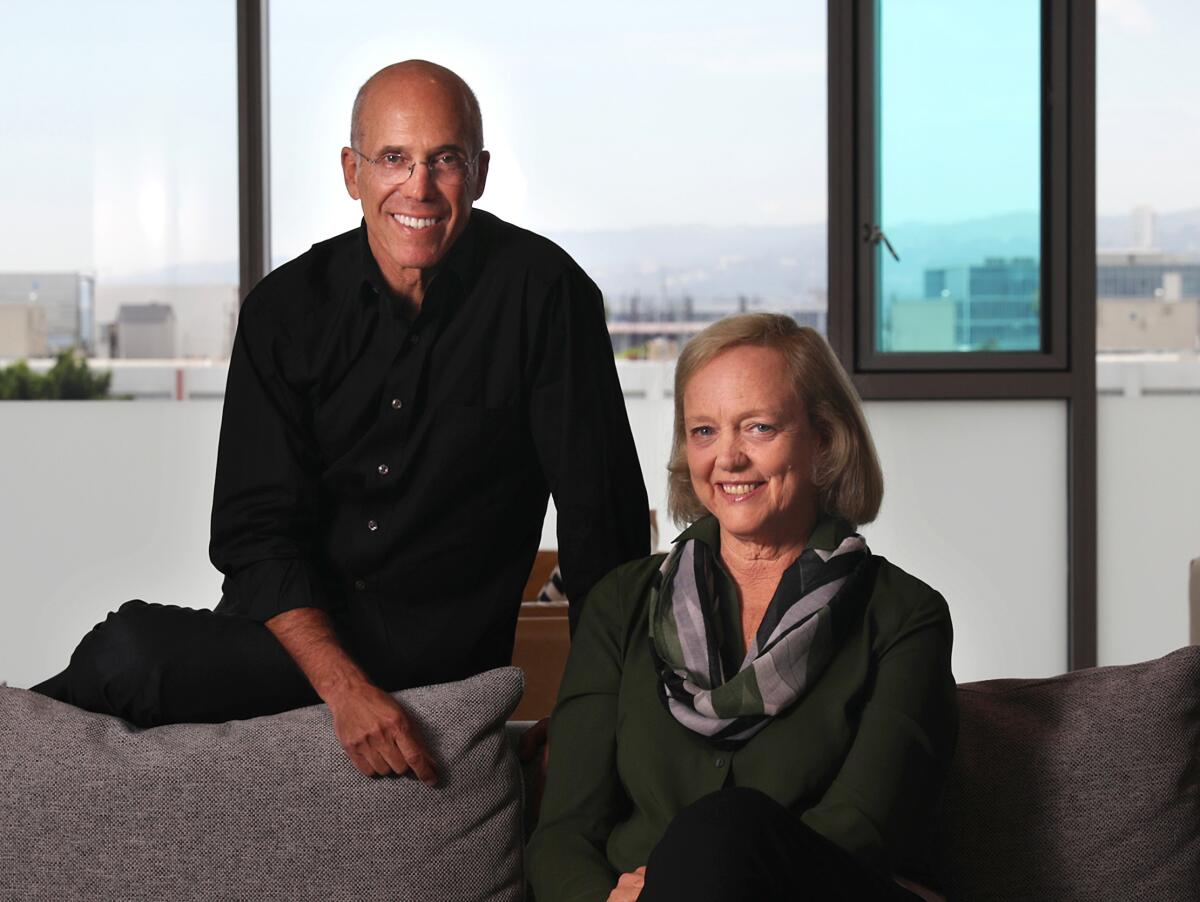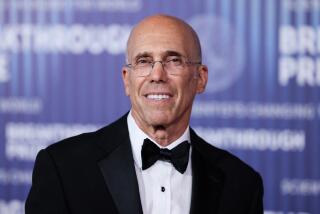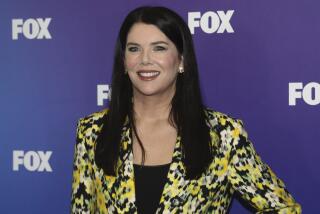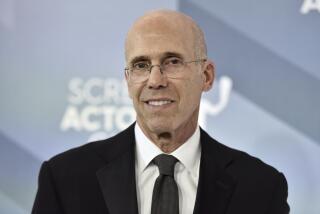Can Chrissy Teigen help launch Quibi to Netflix-level binging during coronavirus quarantine?
- Share via
As the coronavirus outbreak spread last month, producers Jonah Bekhor and Jonas Bell Pasht worried their Quibi show, “The Nod with Brittany & Eric,” was doomed. The duo had taken over a loft in Manhattan’s Flatiron District to film the black culture show, hosted by podcasters Brittany Luse and Eric Eddings, with episodes planned to air daily on the new streaming service.
“We weren’t even sure how we could continue to do the show,” Bell Pasht said.
To save it, Bell Pasht and Bekhor fashioned sets with multiple cameras in each host’s Brooklyn apartment so they could film in isolation. Within a week, they shot a test run to see if it could be ready for Quibi’s debut next week. “It took five days of 14-hour FaceTime sessions,” Bekhor said. “The rhythm of how we communicated was unlike anything we’d ever done before.”
The rush to salvage “The Nod” is just one example of how the coronavirus crisis brought a new layer of uncertainty for Quibi, the subscription streaming service led by DreamWorks Animation co-founder Jeffrey Katzenberg and former Ebay Chief Executive Meg Whitman.
For these two towering figures in the worlds of Silicon Valley and Hollywood, Quibi represents a bold — some would say risky — bet that consumers will be willing to pay for high-end short-form video designed for mobile phones. Since 2018, they’ve wrangled $1.75 billion from venture capital firms and entertainment and tech giants, including Walt Disney Co. and Alibaba Group, to fund their Hollywood-based business, which has grown to 265 employees, mostly under 40.
Quibi (short for “quick bites”) launches Monday with 50 shows and movies mainly targeting young adults, ages 25 to 35. It charges $7.99 a month, or $4.99 a month with ads, after a 90-day free trial. Each episode lasts 10 minutes or less, and some of them have production costs rivaling prestigious TV dramas.
Content falls under three categories: movies presented in bite-sized chapters; unscripted and documentary series; and “daily essentials,” or up-to-the-minute news and talk shows. At launch, Quibi is touting shows such as Chrissy Teigen’s “Judge Judy”-esque “Chrissy’s Court,” the Liam Hemsworth thriller “Most Dangerous Game” and the Sophie Turner vehicle “Survive.”
But there are plenty of skeptics in Hollywood and on Wall Street. Some analysts doubt young people would pay for short videos when they can get infinite entertainment for free from YouTube and TikTok. YouTube last year backtracked on its plan to put most of its shows such as “Cobra Kai” behind a $11.99-a-month paywall. Free platforms have also struggled with short-form video. Verizon’s ad-based service Go90 shut down because it couldn’t generate a large enough audience.
Convincing millions of people fork over cash will become even harder if the COVID-19 pandemic plunges the economy into a prolonged recession. Additionally, the competition for streaming eyeballs has intensified in recent months with the unveiling of Disney+ and the impending HBO Max from AT&T and Peacock from NBCUniversal.
“When people are paying for video, they aren’t used to getting something short,” said EMarketer analyst Ross Benes. “I think there is some consumer psychology that they will have to overcome there.”
Katzenberg, 69, acknowledged that the coronavirus crisis has scrambled any previous expectations for how Quibi will perform. “All human behavior as we know it in America is upside down and inside out,” he said in an interview last week.
Indeed, Katzenberg and Whitman’s pre-COVID-19 pitch for Quibi feels like something from another world. Quibi ads — including a $5.6-million Super Bowl commercial — sold it as something people would watch on-the-go while waiting in line for coffee, riding the subway and doing other activities now curbed by social distancing guidelines.

But debuting in the time of stay-at-home measures could also be an advantage. Quibi’s shows are designed for mobile phones, and people are glued to their devices like never before. Nielsen on Tuesday said U.S. consumers watched more than 156 billion minutes of streaming content during the week of March 16, more than double the comparable time period from the year prior.
“It’s probably both the best and the worst time to be launching,” said Rob Fishman, co-founder of Brat TV, a company that makes shows featuring YouTube stars. “On the bright side, we’ve seen viewers flocking to online video in unprecedented numbers. On the other side, people have more choices than ever, and they’re certainly not ‘on-the-go.’”
Katzenberg said Quibi will still be able to attract audiences, even when their commute is a short walk from bed to the dining room table. The company did not share any target goals for subscribers.
“You have as many in-between moments today as you had a month ago. They are just different,” he said. “Today your in-between moments are in between home-schooling your kids or entertaining them and in between answering emails and your FaceTimes and your Zooms and Slacks. You can’t do those things from 9 in the morning and 5 at night without breaks.”
Nonetheless, Quibi has adjusted plans dramatically, despite sticking with its launch date. In early March, Quibi extended its initial two-week free trial to 90 days.
Productions were delayed, including two stop-motion series, “Gloop World” and “Micro Mayhem,” and the movie “Swimming with Sharks.” “Hot Off the Mic,” a show based on live comedy acts at clubs in L.A. and New York, was put on hiatus. A red carpet event was canceled, leaving Quibi stars to promote their shows from the safety of social media.

The company has also weathered significant challenges independent of the coronavirus, including management turnover. Tim Connolly, head of Quibi’s partnerships and distribution, left in August, followed by the exit of Janice Min, head of daily content, who left in September. Min declined to be interviewed for this article and Connolly did not respond to requests for comment.
In November, Diane Nelson, a respected former DC Entertainment president who was Quibi’s head of content operations, quit. In a letter to Quibi staff, Nelson said she resigned “given several personal priorities and upon much reflection.”
Katzenberg downplayed the high-profile exits. “It didn’t work out, or wasn’t the right fit or the right place, whatever it is,” he said.
Following the departures, Quibi got into hot water in January when tech news outlet the Information started contacting Quibi employees. Whitman, at a staff meeting, compared journalists to sexual predators priming their child targets. She later apologized for the remarks.
Most recently, tech company Eko sued Quibi for patent infringement and mishandling of trade secrets over a feature in Quibi’s app that allows people to change their perspective on videos by turning their phones horizontally or vertically. Quibi sought a court order to establish that it didn’t steal Eko’s technology.
Ultimately, Quibi’s success hinges on whether any of its marquee programs take off.
Jack Davis, CEO of digital horror production company Crypt TV, said the stay-at-home climate will help draw attention to Quibi’s shows. He pointed to Netflix’s documentary series “Tiger King,” which has become a viral sensation among people sequestered at home.

“The potential for those shows right now feels higher to me,” said Davis, who does not have a deal with Quibi. “If that happens with a Quibi show, it could lift the whole thing.”
Quibi has won over many producers by spending big on content, sometimes offering up to $6 million for an hour’s worth of episodes. As an additional lure for talent, Quibi allows creators to take back ownership of their intellectual property after seven years, an unusual proposition. Producers can sell a longer version of their show after it has been on Quibi for two years.
Shannon Boodram, whose new intimacy advice show, “Sexology with Shan Boodram,” debuts on Quibi, said executives gave her more creative leeway than she’s used to.
“They said, ‘You guys can go a little racier than this,’” the 34-year-old Mount Washington-based host said. “I’ve never heard that from a network before.”
While many are skeptical, few in Hollywood are willing to bet against Katzenberg, who oversaw Walt Disney Studios during its 1990s animation renaissance and then launched DreamWorks Animation.
Whitman, who ran unsuccessfully for California governor as a Republican, is a seasoned business executive, leading Ebay to rapid growth and overseeing a major corporate restructuring at Hewlett Packard.
In an early sign of success, the company sold $150 million in ad inventory for its first year. The company also has a partnership with T-Mobile.
“The talent feels his presence and his passion and that goes a long way,” said Frank Jung, co-head of Creative Artists Agency Digital Media, referring to Katzenberg. “A lot of times dealing with other new platforms that are no longer around, you didn’t get that feeling. They didn’t have their ducks in a row. He hired the right team.”
Katzenberg aggressively pursued talent to ramp up the pipeline.
Lena Waithe and Boardwalk Pictures head Andrew Fried were nearing a deal to sell a docuseries on sneaker culture to another streaming service before Katzenberg called them. Fried assumed it would take weeks before a meeting happened. Instead, he and the other producers went to Katzenberg’s office that Thursday. “He made an offer in the room,” Fried said.
Waithe, who stars in and produces the show, titled “You Ain’t Got These,” said Katzenberg was frank about Quibi’s untested business model.
“He wasn’t selling me a bill of goods,” Waithe said. “He told me, ‘This is new. It’s a risk, but I think the risk will be worth the reward.’”
The short format posed difficulties for producers, who often have to distill complicated subjects and hours of footage into compact chunks. Katzenberg, long known for his hands-on approach with creatives, supplies frequent notes.
Phil Abraham, the director behind “Most Dangerous Game,” said Katzenberg helped provide guidance and notes for the Quibi project, advocating for chapters to end on a cliffhanger or big reveal.
“Reading it was different from a normal script,” Abraham said. “It was almost like it was on ADD or something. It was almost like a fast-and-furious read.”

Quibi executives discourage extraneous material that shifts from the main focus of the story, which forces writers to make difficult decisions to fit the strict length requirements of the episodes.
OBB Media founder Michael Ratner experienced this while producing “&Music,” a documentary series featuring such famous artists as Ariana Grande, J Balvin and Ozzy Osbourne and their collaborators.
While planning an episode about rapper YG and his sound mix engineer Derek Ali, the producers mapped out a story line involving synesthesia, a condition in which people sometimes experience sound by seeing colors. But after talking with Quibi executives, they decided the idea was too esoteric for the medium.
“We dropped it because it was too much,” Ratner said. “We’ve had to challenge ourselves to make tight, well-edited stories.”
Katzenberg is well aware of the naysayers. However, he said he’s waiting to see the response from audiences when they actually get to see the app and the content for themselves.
“For my entire career, my real boss has been the consumer,” Katzenberg said. “I feel like I work for them. Ultimately they are the deciders. I’m very excited for all of us at Quibi to actually see what our boss is like.”
More to Read
Inside the business of entertainment
The Wide Shot brings you news, analysis and insights on everything from streaming wars to production — and what it all means for the future.
You may occasionally receive promotional content from the Los Angeles Times.












